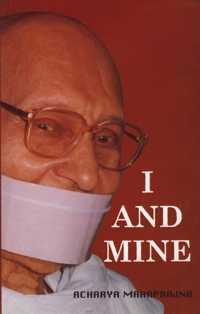
The relation entailed in the expression 'I and my mind' throws up many ideas.
- Can the 'I' or one's self (ego) be explained without taking the mind into consideration?
- Is it not true that the mind itself deeply involved with its own inventions is creating and explaining the 'I'.
- Is the intellect not a section of the mind? Is extrasensory knowledge real?
There are plenty of such discussions and for thousands upon thousands of years they have been repeated in the same language. The knowledge of an average man occurs outside the limits of indirect experience. Therefore, the questions mentioned above have never been properly answered.
The solution to these questions lies in steadying the mind.
This very state is called self-realization.

'The experience made after the mind has been dissolved does not constitute knowledge acquired through the ear. It is the kind of knowledge, which comes from the depth of consciousness out of reach for the mind. Knowledge acquired through the senses and the mind cannot exceed the limits of those instruments. But is knowledge limited to the scope of these instruments? Had it been so, scientific instruments would have been useless. Even the reach of the mind and that of the senses are different from each other. Had it not been so there would have been no ascending order in the stages of evolution. Whatever has become known to man in thousands of years is nothing more than a drop as compared to the ocean of the unknown. Without crossing that ocean, to aver that 'it is like this' means denial of the unknown. How can any metaphysician agree to do so?
The three stages of consciousness - sensory, mental and intellectual - are tangible and perceptible, but the transcendental or trans-sensory stage is not tangible and perceptible. It is not so to that part of man which is made up of senses, mind and intellect. Therefore, even though being inseparable from consciousness, I am divided into outer consciousness and inner consciousness. In spite of being intangible, I am divided into two forms:
- the visible and the invisible.
This dichotomy can end only with the help of philosophy.
Philosophy is transparent, universal, tangible knowledge. Being not an intellectual exercise, its reach far exceeds that which is possible for the intellect. The visible and the tangible present no problems; problems abound within the limits of the invisible and the intangible. The formulations of philosophy are beyond the reach of the senses, mind, and intellect. That is why denying then gives a sort of easy, natural feeling, which is not there is accepting them. One can have a clear understanding of problems by comparing the knowledge and kinesis arising out of instinctive human nature and those of Indian philosophy.
| # | Instinctive knowledge | Philosophical knowledge |
| 1 | Belief in the visible world | As compared to the visible, belief in the invisible world |
| 2 | Belief in the present life. | As compared to the present life, belief in eternal life |
| 3 | Intellect as final authority | Philosophy as final authority |
| 4 | Believe in sensory experience | As compared to the sensory, belief in trans-sensory experience |
| 5 | Belief in truth known through the mind. | Belief in truth known through the soul |
| # | Instinctive kinesis | Philosophical kinesis |
| 1 | Attachment to sensory objects | Detachment from sensory objects |
| 2 | Attachment to the transient | Attachment to the perennial |
| 3 | Indulging wants | Restraining wants |
| 4 | Letting oneself loose towards the outer world | Letting oneself loose towards the inner being |
| 5 | Socialness | Individuality |
I will present questions posed above in the context of the distant realm of philosophy, in the language of 'mineness' and I will answer them too in the language of 'mineness'.
Readers should not confuse it with my ego.
They should understand how much more subtle, effective and potent the philosophical personality of a man is than his intellectual personality.
Peace results only from this understanding.
Acharya Tulsi planted the seed of spirituality in my inner consciousness. It has fructified in the form of philosophy or direct experience. That is why I give greater importance to direct or visible truth than to that derived from hearing, thinking or reasoning. The competence and skill needed for awakening the inner experience are not found in accepting what others say and making them to accept what we say. That day will be a great day of religious achievement when we offer the pride of place of philosophy.
Some parts of the present book are based on my discourse 'Sixteen Maxims of Mental Peace' - I conducted this series of discourses in Anuvrat Camp at Delhi in 1966. Muni Shri Chandji has compiled them. Elsewhere also his compilations are there at some places. I have received the cooperation of Muni Shri Chandji and Chandan Mal 'Chand', M.A. in the form of their brief notes, in re-writing the discourses on 'Religion in the Context of Anuvrat.' Muni Dulahrajji has edited the present book. I express my hearty thanks to them.
Acharya Mahaprajna
 Acharya Mahaprajna
Acharya Mahaprajna


